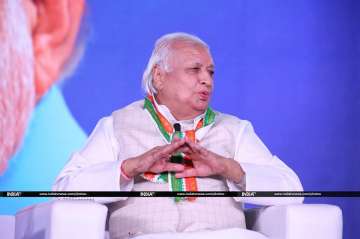India TV Samvaad: Gyanvapi mosque decision should be left to the courts, says Arif Mohammad Khan
India TV Samvaad: Gyanvapi mosque decision should be left to the courts, says Arif Mohammad Khan

India TV Samvaad: Kerala Governor Arif Mohammad Khan on Monday said the ongoing dispute over the Gyanvapi mosque should be left for the courts to decide. He also suggested the setting up of a Truth Commission that the South African government set up by Nelson Mandela to uncover the truth of human rights violations that took place during centuries of apartheid rule. Similarly, he said, such a commission can be set up to go into all historical excesses that were committed in the past.
Responding to questions at the day-long ‘India TV Samvaad’ Conclave, Khan recalled how the solution to the Babri Masjid dispute in Ayodhya was torpedoed at the last moment during former PM VP Singh’s rule.
“Even Advani Ji had supported the move from Bihar. Under this agreement, two out of the three domes were to be given to Hindus and one dome would have remained with Muslims. A draft ordinance was even kept ready, but some people went to the hotels where the Muslim leaders were staying and forced them to withdraw from the deal”, Khan said.
The Kerala Governor disclosed that when the locks of the Ram Janmabhoomi-Babri complex in Ayodhya was reopened in 1985 on court orders, he had gone to the then Prime Minister Rajiv Gandhi to tell him that this could cause serious problems in future.
Khan claimed, that Rajiv Gandhi had then told him “I had informed them (Muslim leaders) before the building (Babri mosque) was unlocked”.
Khan said, at that time the All India Muslim Personal Law Board chief Ali Mian had kept the board out of the dispute, but after Rajiv Gandhi’s death, the AIMPLB backtracked and decided to work with Babri Masjid Action Committee to escalate the dispute.
Khan praised Prime Minister Narendra Modi and said that most of the developed countries of the world have now accepted India’s capabilities. “Modi has broken our slavish mindset from the past, and I consider this his greatest achievement.”
The Kerala governor cited two big achievements of Prime Minister Modi: (1) abolition of ‘triple talaq’ practice and (2) abrogating of Article 370.
“History will remember him as a statesman who acted as a social reformer by abolishing ‘triple talaq’. Since 2019, when this law was enacted, there has been a 90 per cent drop in ‘triple talaq’ cases in the Muslim community. Not only Muslim women but think of those Muslim children, whose lives were thrown into turmoil because of ‘triple talaq’. This evil practice (kupratha) had been going on since the 13th century in India. While other Muslim countries had abolished it, we continued with this practice. Once the current political dust settles down, people will realize the big step that has been taken.”
On abrogation of Article 370, Arif Mohammad Khan said: “This very article in our Constitution was giving encouragement to separatist mindset in Kashmir, and it was an acceptance of the fact that the fate of Kashmir is not yet final. Legally speaking, Kashmir’s fate was negotiable, because of Article 370. But now, it has become non-negotiable. Kashmir was, is and shall aways remain part of India.”
On the question of lynching of Muslims, the Kerala Governor said: “Who started this practice of lynching? When there was a demand for banning Salman Rushdie’s book, there were more than 300 cases of lynching in India. I faced lynching attempts thrice. When I was attacked in Jamia Millia, I barely saved my life when somebody hit my head with an iron rod. Doctors in AIIMS told me that had I been 10 minutes late, I would not have survived. So, who taught lynching? Remember, even today, in villages, Hindus and Muslims stay peacefully together, they have close relations, but only a few people sitting in Delhi, rake up communal tension. They are self-appointed community leaders.”